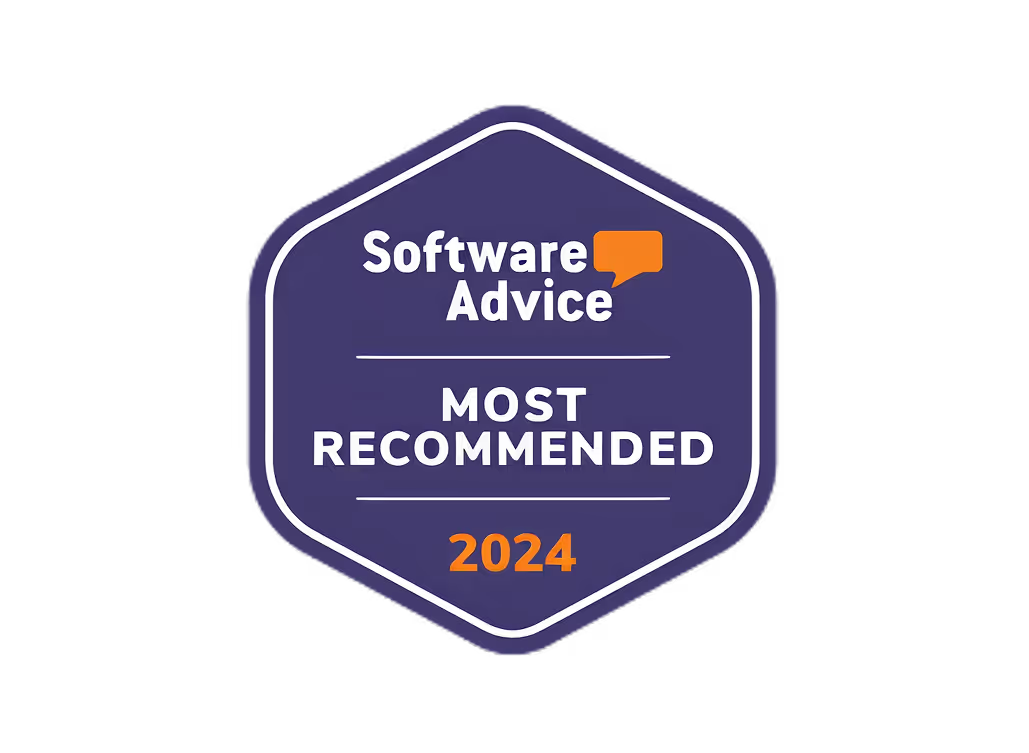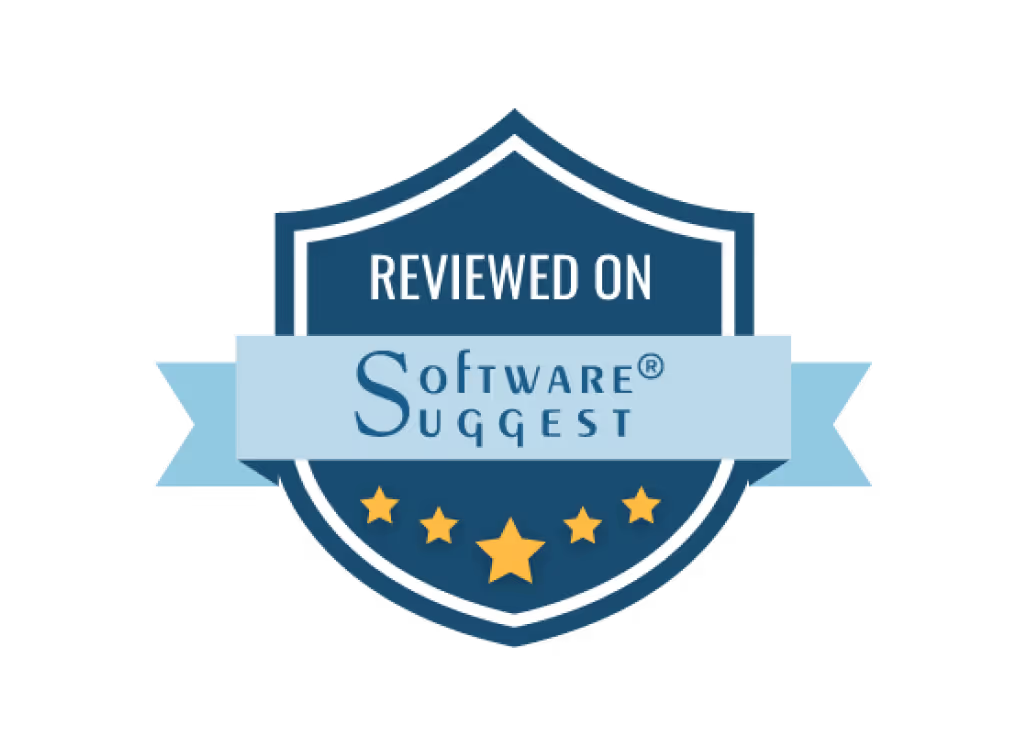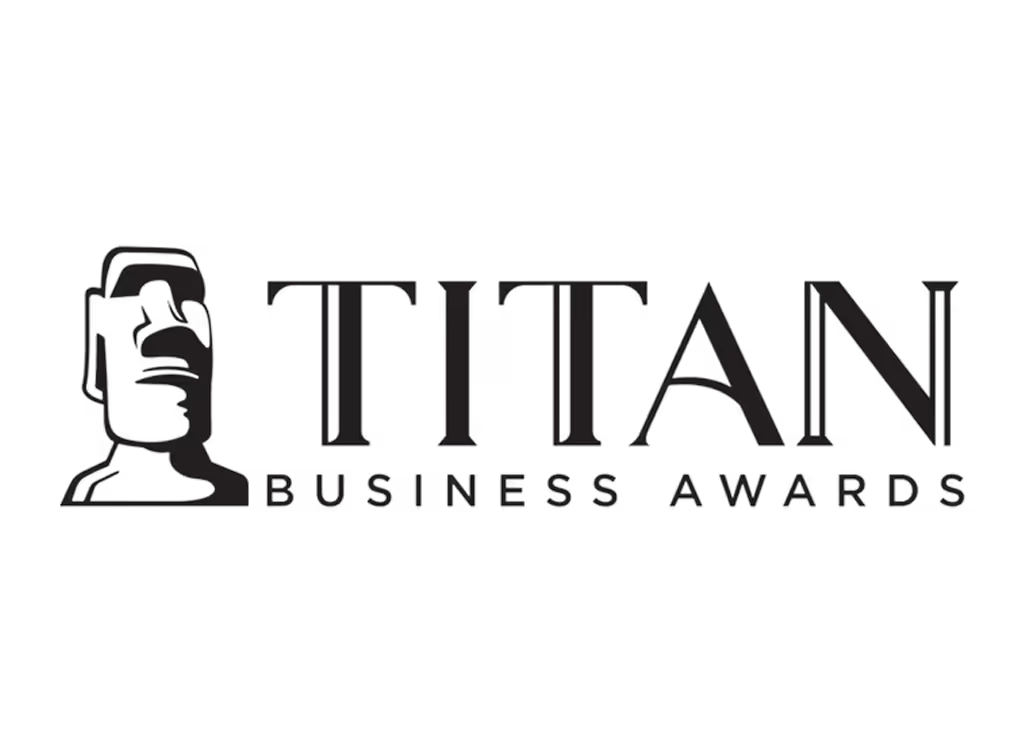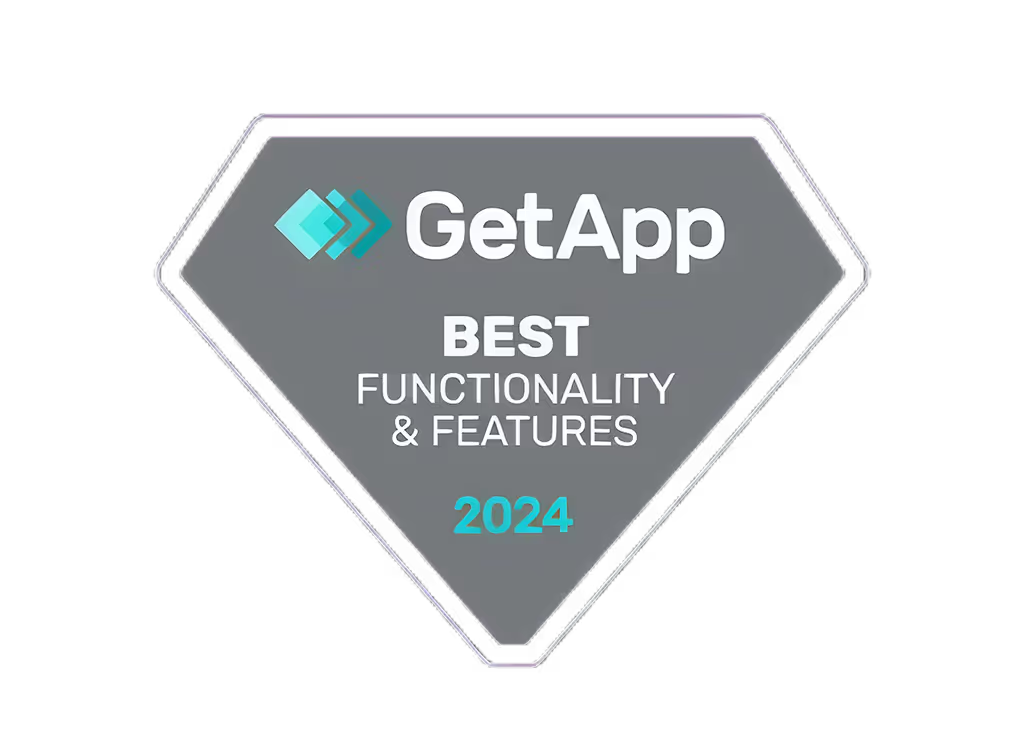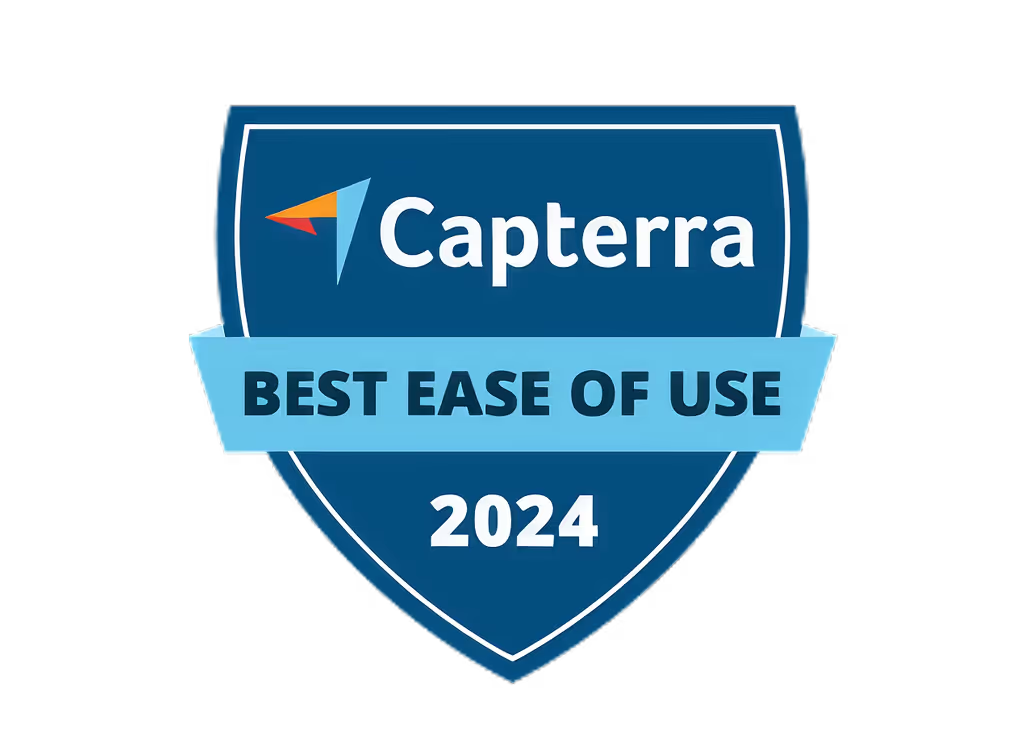12 Best AI Tools for Marketing to Boost ROI in 2025

In 2025, marketing moves at the speed of AI. Staying competitive means leveraging intelligent automation to create, analyze, and optimize campaigns faster than ever before. But with a new tool launching nearly every day, how do you separate the game-changers from the noise? This guide cuts through the hype, providing a curated list of the best AI tools for marketing, categorized by their core function so you can find exactly what you need.
This isn't just another list. We'll dive deep into each platform, analyzing their specific features, ideal use cases, and practical limitations to help you build a powerful, efficient, and data-driven marketing stack. We’ve done the research to show you not just what these tools do, but how they fit into a modern workflow. To understand the broader impact and importance of artificial intelligence, consider a comprehensive list of the best AI tools for small business from AccountShare, which highlights solutions for boosting overall growth.
Our goal is to help you make informed decisions quickly. Each tool review includes:
- A concise summary of its primary function.
- Key features and what makes them unique.
- Clear pricing information.
- Honest pros and cons based on real-world application.
- Screenshots and direct links for easy evaluation.
Whether you're a founder looking to scale, an agency owner optimizing client results, or a marketing manager tasked with driving performance, this is your authoritative resource for finding the right AI tools to achieve measurable growth. Let's get started.
1. Quickads.ai: The All-in-One AI Ad Creative Platform
Quickads.ai positions itself as a powerhouse in the AI marketing landscape by consolidating the entire ad creative process into a single, intuitive platform. It’s engineered to take a simple product link or text prompt and generate a comprehensive suite of high-performance image and video ads tailored for various platforms in mere seconds. This makes it one of the best AI tools for marketing teams looking to achieve creative velocity and scale without a large in-house design team.
The platform’s core strength lies in its data-driven approach. Quickads.ai doesn’t just generate random creatives; its AI is trained on a massive library of over 20 million successful ads. This data-backed foundation informs every suggestion, from copy and visuals to layout and calls-to-action, significantly increasing the probability of launching a campaign that resonates with target audiences and drives results. It effectively removes the guesswork that often plagues creative ideation.
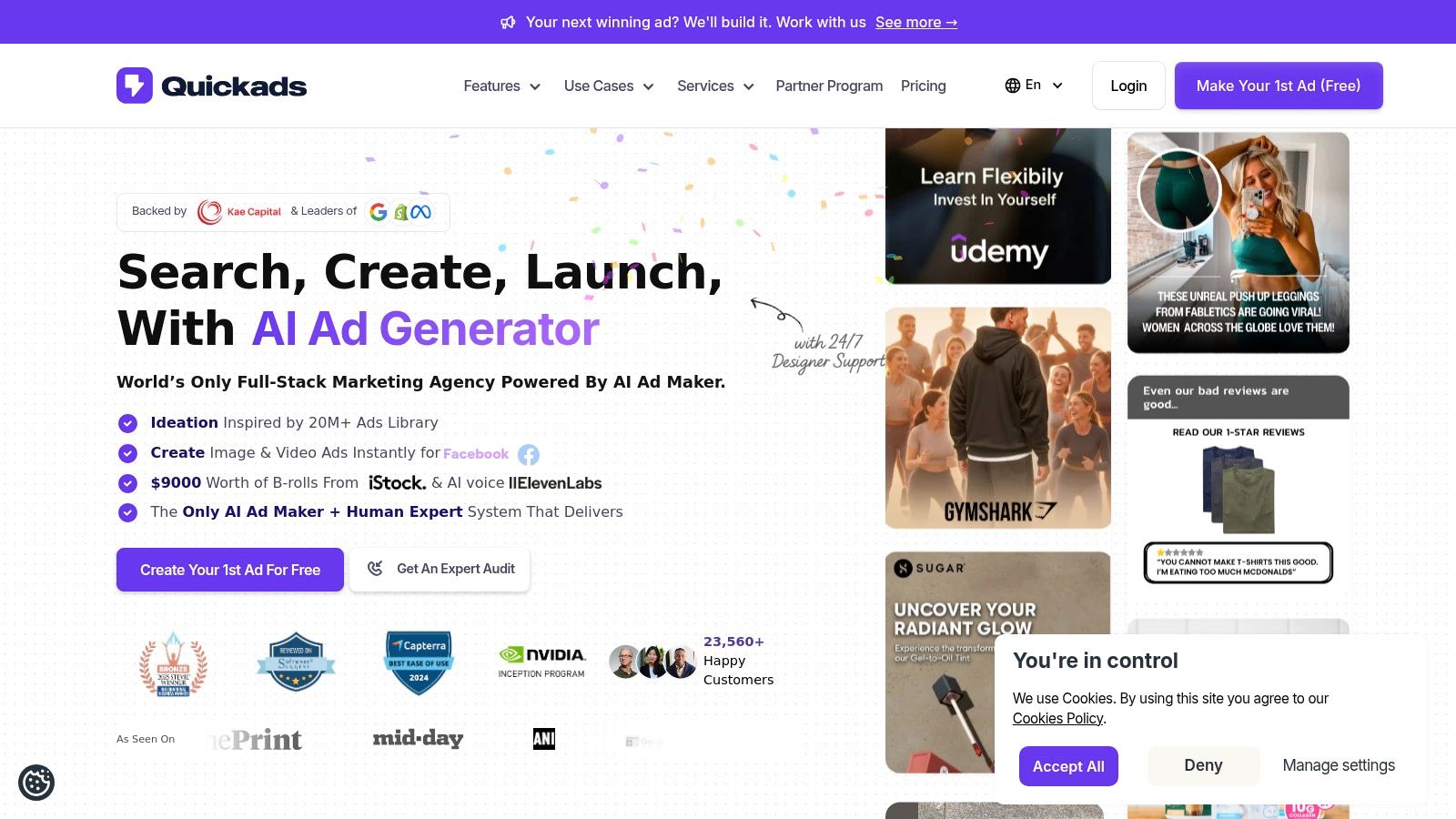
Key Features & Use Cases
- Multi-Format Ad Generation: Instantly create assets for various placements, including social media stories, carousels, and in-feed video ads. This is ideal for omni-channel campaigns where consistency and speed are crucial.
- AI-Powered Copywriting: The tool generates compelling ad copy, headlines, and descriptions based on your product information, saving hours of brainstorming.
- Brand Kit Integration: Maintain brand consistency by uploading your logos, color palettes, and fonts. The AI then applies these elements across all generated creatives.
- Performance-Based Analytics: The platform provides insights into which creative elements perform best, enabling data-informed optimization for future campaigns.
Practical Implementation
For a small e-commerce business, a typical workflow involves pasting a product URL into Quickads.ai. The platform then automatically pulls product images and details to generate 10-15 ad variations. The marketing manager can quickly review, make minor edits directly on the platform, and download the assets formatted for Meta Ads, TikTok, and Google, launching a multi-platform test in under 30 minutes.
- Pros:
- Drastically reduces creative production time from days to minutes.
- Data-backed approach increases the probability of launching high-performing ads.
- Scalable plans from free trials to full-service agency models fit various business needs.
- Strong social proof with over 25K customers and a reported average ROAS of 5.12x.
- Credit and download limits on lower-priced tiers can be restrictive for high-volume users.
- While the AI accelerates creation, ultimate campaign success still hinges on strategic targeting and budget allocation.
Website: https://www.quickads.ai
2. G2
While not an AI tool itself, G2 is an indispensable discovery platform for any marketer serious about finding the best AI tools for marketing. It’s a massive software marketplace and peer-review site where you can compare thousands of applications based on verified, recent user feedback. Instead of relying on vendor marketing copy, you get direct insights from real users, making it a crucial first step in your research process.
Its strength lies in its sophisticated filtering and categorization. You can drill down into niche AI categories like "AI Video Generation" or "AI Writing Assistants," then filter results by company size, user satisfaction ratings, and specific features. This allows you to build a highly relevant shortlist of potential tools that fit your exact needs and budget.
Key Features and Use Case
- Verified User Reviews & Grids: Access detailed, multi-faceted reviews and see how tools stack up against each other in their proprietary Grid reports, which plot vendors by market presence and customer satisfaction.
- Side-by-Side Comparisons: Directly compare features, pricing, and user ratings for up to four different platforms simultaneously. This is perfect for the final decision-making stage.
- Emerging AI Categories: G2 actively tracks and creates new categories, helping you discover cutting-edge tools before they become mainstream.
Practical Tip: Use G2 to validate the tools you find elsewhere. If a tool has a strong presence and positive, recent reviews on G2, it’s a good sign of its market viability and user satisfaction.
Feature AnalysisAssessmentPricingFree to browse and compare; vendors may have paid profiles.Ease of UseThe interface is intuitive, with powerful filters that are easy to apply.Unique OfferingRelies on crowd-sourced, verified user reviews for unbiased insights.
Pros:
- Excellent for discovering challenger brands and lesser-known AI tools.
- Buyer intent filters help you find software popular with similar companies.
Cons:
- It's a referral site, not a marketplace; you must click out to purchase.
- The quality and depth of individual reviews can vary significantly.
Website: https://www.g2.com/
3. Capterra
Similar to G2, Capterra is a comprehensive software directory, not a direct AI tool, but it's an essential resource for marketers comparing the best AI tools for marketing. It functions as a massive library of business software, allowing you to browse, filter, and read user reviews across hundreds of categories, from AI-powered email marketing to sophisticated social media automation platforms. It provides a high-level overview perfect for initial research.
Capterra's value lies in its straightforward presentation and curated guides. The platform often features educational roundups and "Top 20" lists that can introduce you to leading and emerging AI solutions. For marketing teams, this is a great way to quickly build a shortlist of potential tools based on user ratings and vendor-supplied feature lists before diving deeper into demos or trials.
Key Features and Use Case
- Category Pages & Guides: Explore dedicated pages for specific software types, like "AI Marketing Tools," which often include educational content and curated vendor lists.
- Pricing & Feature Callouts: Get a quick snapshot of a tool's capabilities and cost structure directly on the listing page, making it easy to screen options based on budget.
- User Ratings & Shortlists: Leverage crowd-sourced star ratings and comparison features to see how different AI tools are perceived by their actual user base.
Practical Tip: Use Capterra’s curated guides to get a quick market overview. These roundups are great for discovering the key players in a specific AI niche without having to perform dozens of individual searches.
Feature AnalysisAssessmentPricingFree for users to browse, compare, and read reviews.Ease of UseThe interface is very user-friendly, designed for non-technical buyers.Unique OfferingCombines user reviews with helpful curated guides and clear feature lists.
Pros:
- Excellent for building high-level shortlists for non-technical buyers.
- Free to use with very wide coverage of different software vendors.
Cons:
- Sponsored placements can influence the order and visibility of tools.
- Feature lists are often vendor-supplied and may lack critical nuance.
Website: https://www.capterra.com/
4. Product Hunt
Product Hunt is the digital town square for tech enthusiasts and the go-to discovery platform for bleeding-edge AI marketing tools. It’s where new apps "launch" daily, competing for community attention and upvotes. For marketers, this makes it an essential resource for spotting innovative AI solutions the moment they become public, often before they appear on larger review sites.

Unlike structured review aggregators, Product Hunt thrives on community buzz and direct interaction with the creators. You can see demos, read the founder's pitch, and dive into the comment threads to see real-time feedback, questions, and potential use cases from other marketers. This unfiltered access provides a unique pulse on what’s new and what’s genuinely capturing the industry's interest, making it one of the best ai tools for marketing discovery.
Key Features and Use Case
- Daily Launches & Leaderboard: Every day features a new list of products. The upvote system creates a leaderboard, quickly highlighting the most popular and intriguing tools of the day.
- Community Discussions: The comments section is a goldmine. You can ask founders questions directly, see what features other users are requesting, and gauge initial reactions and usability concerns.
- Topics and Collections: Follow specific topics like "Marketing" or "Artificial Intelligence" to get a curated feed of relevant launches, helping you filter out the noise.
Practical Tip: Check Product Hunt for exclusive launch-day deals. Many founders offer significant discounts or lifetime deals (LTDs) to early adopters to generate initial momentum and user feedback.
Feature AnalysisAssessmentPricingFree to browse, comment, and upvote.Ease of UseThe site is very straightforward; it's designed for quick browsing and discovery.Unique OfferingFocuses on brand-new, often early-stage products with direct founder access.
Pros:
- Fastest way to spot brand-new AI tools and limited-time deals.
- Direct links to official product sites for signup or purchase.
Cons:
- Early-stage tools can be less stable or may have bugs.
- Pricing and features can change quickly after the initial launch period.
Website: https://www.producthunt.com/
5. AppSumo
AppSumo is a deal marketplace that has become an essential hunting ground for marketers seeking the best AI tools for marketing on a budget. Instead of committing to full-price annual subscriptions, you can find heavily discounted, and sometimes lifetime, deals on emerging AI copywriting, SEO, social media, and automation platforms. This makes it an ideal platform for startups and small businesses looking to experiment with new technology without significant financial risk.
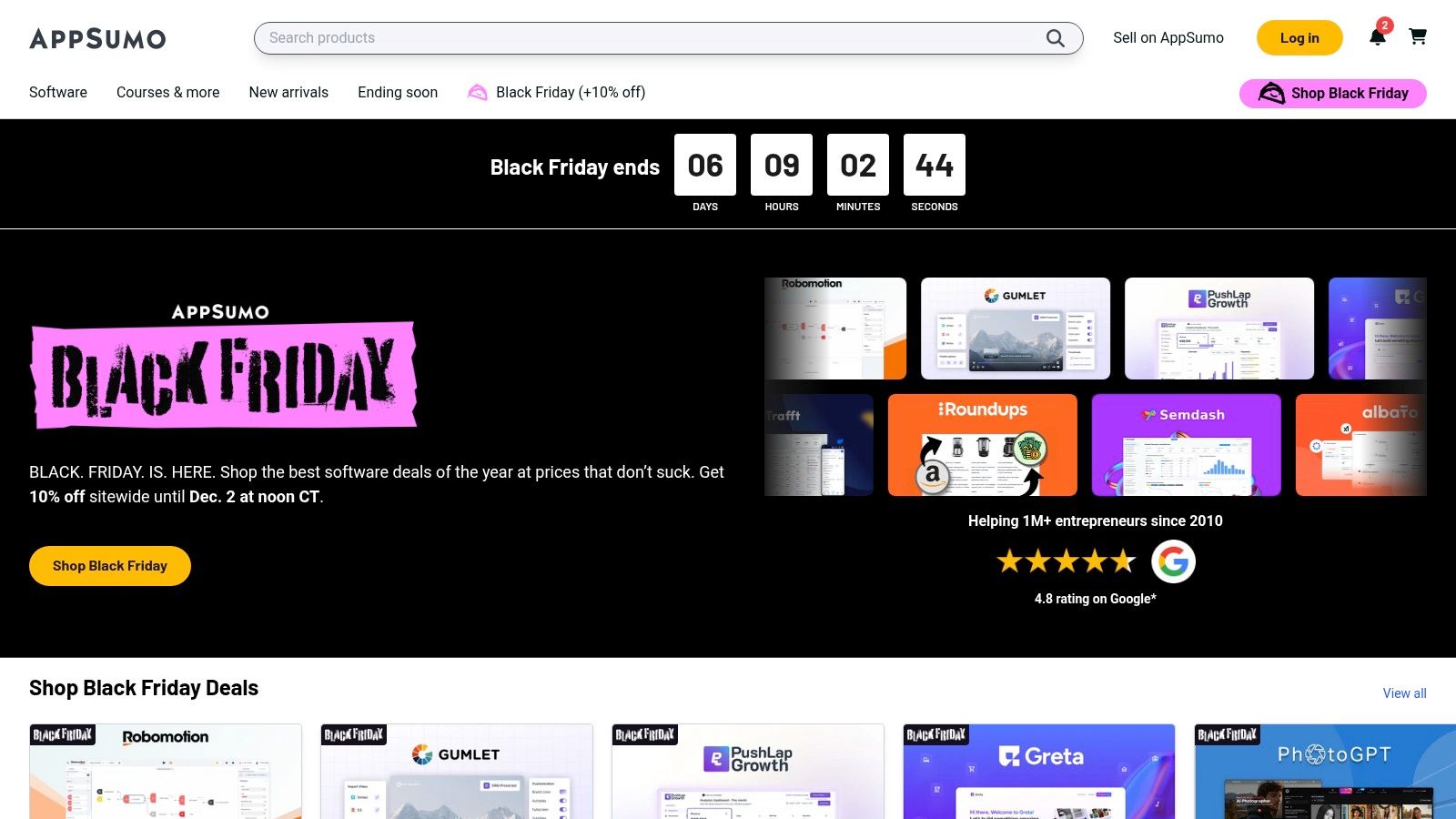
The platform's value lies in its unique deal structure and community feedback. Each product listing features a detailed Q&A section where you can ask the founders direct questions, alongside customer reviews that often provide honest, real-world feedback on a tool's capabilities and limitations. This community-driven due diligence is invaluable when assessing a new or lesser-known AI tool. For more specific integrations and functionalities related to HubSpot, you can explore resources like HubSpot's App marketplace page.
Key Features and Use Case
- Lifetime Deals (LTDs): The core offering is the chance to purchase lifetime access to a software tool for a one-time fee, providing massive long-term value if the tool proves useful.
- Customer Reviews & Q&A: Engage directly with founders and read uncensored feedback from other "Sumo-lings" to gauge a product's true potential and support quality.
- Curated Deal Pages: Each listing clearly outlines deal terms, feature limits, and redemption instructions, ensuring you know exactly what you're buying.
Practical Tip: Always check the review section for common complaints and read the founder's responses in the Q&A. This can reveal a lot about the product's stability and the team's commitment to its development.
Feature AnalysisAssessmentPricingHeavily discounted one-time fees for lifetime deals or annual subscriptions.Ease of UseThe marketplace is simple to navigate; redemption processes are usually straightforward.Unique OfferingAccess to lifetime deals on up-and-coming SaaS and AI tools is unmatched.
Pros:
- Significant savings versus standard monthly or annual software pricing.
- Useful for testing multiple new AI tools without long-term contracts.
Cons:
- Lifetime deals can be risky; products may shut down or change terms later.
- Deal availability rotates frequently and is often time-limited.
Website: https://appsumo.com/
6. Shopify App Store
For marketers operating within the Shopify ecosystem, the official App Store is the primary hub for discovering powerful, integrated AI tools. Rather than being a single tool, it’s a dedicated marketplace where you can find and install AI-powered applications for everything from ad creation and SEO optimization to email marketing automation and social media content. It's an essential resource for e-commerce brands wanting seamless, one-click installations.

The platform’s core strength is its tight integration with the Shopify backend. Apps found here are specifically designed to work with Shopify store data, such as product catalogs and customer information, making them far more effective than generic third-party tools. This direct connection allows for sophisticated automation and personalization that can significantly boost sales and efficiency. Finding the best AI tools for marketing your store is simplified through its robust review and rating system.
Key Features and Use Case
- Ratings and Reviews from Live Stores: Get authentic feedback from other Shopify merchants who have installed and used the apps, helping you gauge real-world performance and reliability.
- Direct Store Integration: Apps can be installed in a few clicks and immediately access store data, enabling features like AI-generated product descriptions or personalized email campaigns.
- Clear Pricing and Trials: Most apps clearly list their pricing tiers, and many offer free plans or trial periods, allowing you to test functionality before committing to a subscription.
Practical Tip: Use the search filters for specific functions like "AI ad generator" or "SEO optimizer" and sort by "Most relevant." Pay close attention to recent reviews to ensure the app is actively maintained and supported.
Feature AnalysisAssessmentPricingVaries widely by app, from free plans to hundreds of dollars per month.Ease of UseExcellent. The one-click install process is simple for non-technical users.Unique OfferingA curated ecosystem of apps built exclusively for Shopify e-commerce workflows.
Pros:
- Installation is incredibly simple, often requiring just a few clicks.
- Apps are built specifically for e-commerce marketing workflows.
- Clear pricing and the availability of free trials on many applications.
Cons:
- Primarily useful only for businesses running on the Shopify platform.
- Some advanced or highly specialized apps can be expensive with high monthly fees.
Website: https://apps.shopify.com/
7. HubSpot App Marketplace (AI Essentials)
For marketers already embedded in the HubSpot ecosystem, the HubSpot App Marketplace is the most seamless way to discover and deploy the best AI tools for marketing. Instead of searching the open web, you can access the curated 'AI Essentials' collection, featuring apps designed to integrate directly into your existing CRM and marketing workflows. This approach eliminates data silos and reduces the friction of adopting new technology, making it a powerful accelerator for any team running on HubSpot.
The core advantage is the tight integration. These aren't standalone tools; they are enhancements that live inside your portal. From AI-powered content creation and prospecting assistants to sophisticated automation agents, each app leverages your existing customer data for maximum context and relevance, turning your CRM into a smarter, more efficient marketing machine.
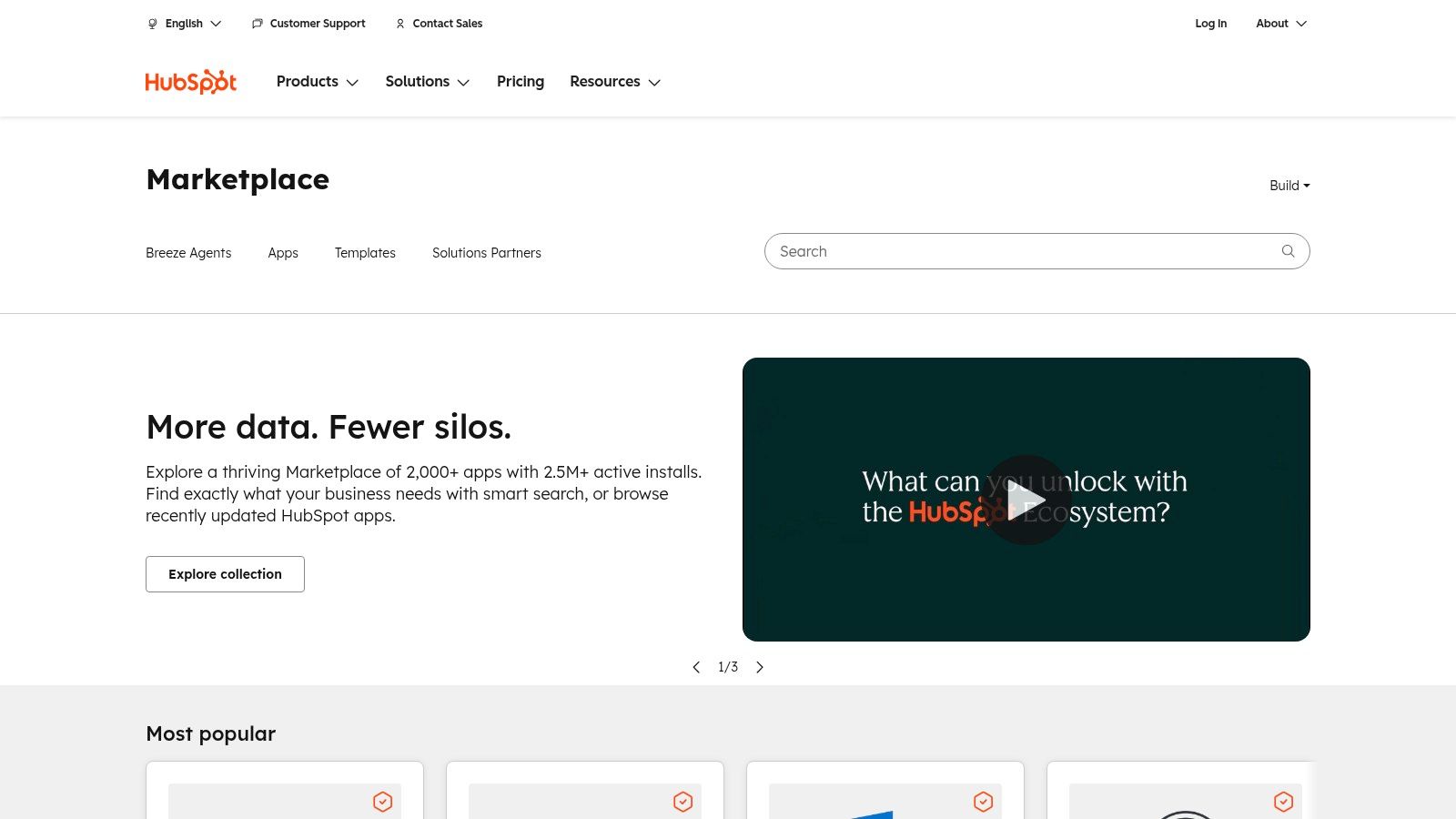
Key Features and Use Case
- Curated 'AI Essentials' Collection: A handpicked list of vetted AI applications for content, prospecting, and automation, ensuring quality and compatibility.
- Direct HubSpot Portal Installation: Install and manage AI tools directly within your HubSpot account, creating a unified workflow and data environment.
- Expansive Marketplace: Beyond AI, gain access to over 2,000 apps that can be connected to your HubSpot instance, covering virtually every business need.
Practical Tip: Start by exploring free or freemium apps in the 'AI Essentials' collection to test their impact on your specific workflows, like generating social media copy from a blog post or summarizing customer interaction notes, before committing to paid solutions.
Feature AnalysisAssessmentPricingFree to browse; requires a HubSpot account. Individual app pricing varies (free, freemium, paid).Ease of UseExtremely simple for HubSpot users, with one-click installation and familiar interfaces.Unique OfferingDeep, native integration with HubSpot CRM data for highly contextual AI outputs.
Pros:
- Trusted ecosystem with quality controls and verified usage statistics.
- Tight CRM and marketing hub integration reduces tool sprawl and data silos.
Cons:
- Requires a HubSpot account to install and use any of the applications.
- Some apps add significant per-seat or usage-based fees to your HubSpot bill.
Website: https://ecosystem.hubspot.com/marketplace/apps/featured/ai-essentials
8. Salesforce AppExchange
For businesses already embedded in the Salesforce ecosystem, the AppExchange is the definitive marketplace for discovering the best AI tools for marketing. It's not just a directory; it’s a highly curated and secure platform where every application is vetted to integrate seamlessly with your existing Salesforce data and workflows, particularly with AI-driven features like Einstein. This ensures data integrity and enterprise-grade governance from the start.
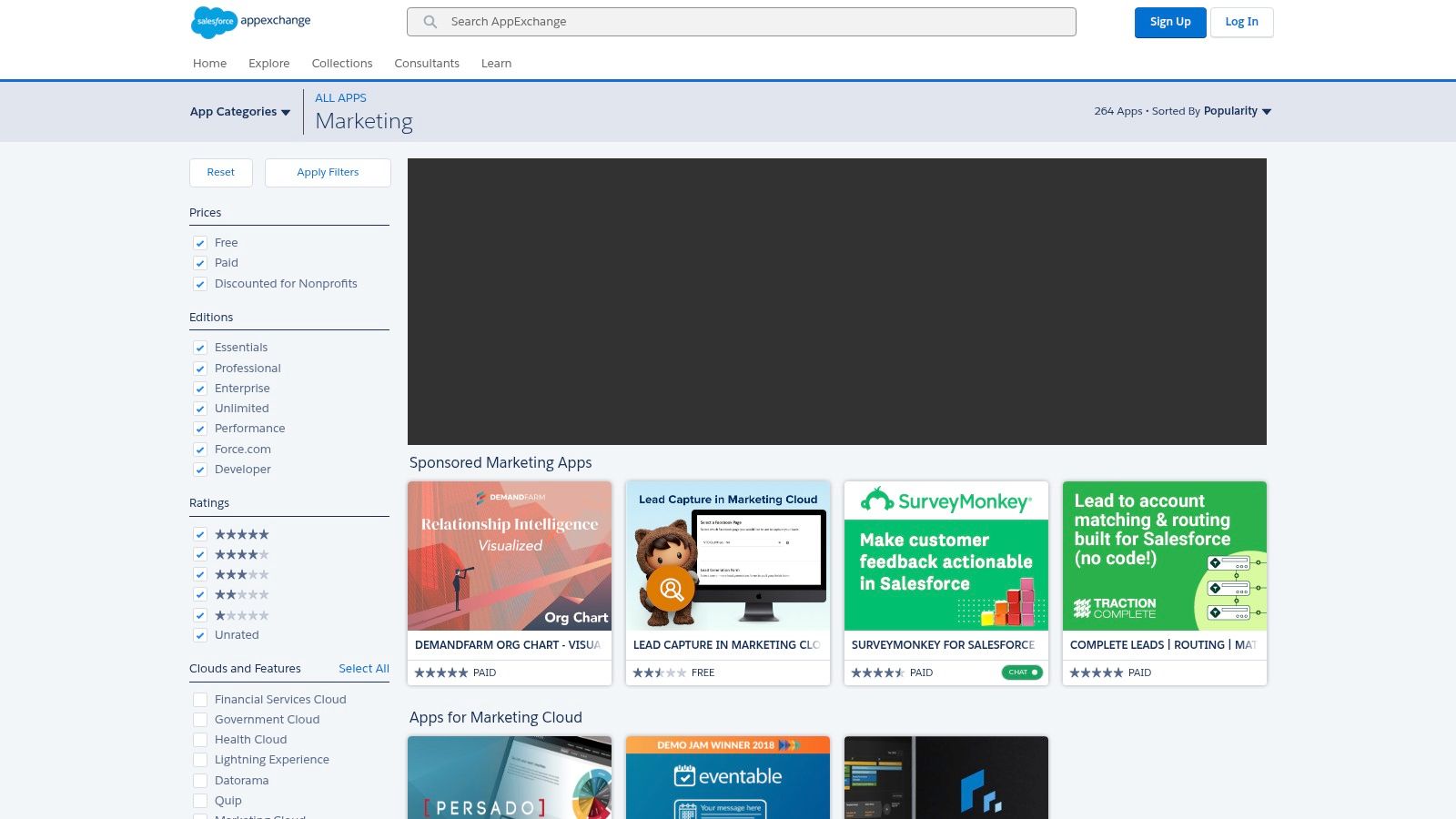
The platform excels at providing solutions that leverage your core CRM data for sophisticated marketing AI applications. You can find specialized tools for AI-powered personalization, predictive analytics, account-based marketing (ABM), and intelligent customer service agents. Because each listing includes security reviews, pricing models, and recent release information, you can make informed decisions with confidence.
Key Features and Use Case
- Curated AI + Data + CRM Collections: Discover vetted apps specifically designed to enhance Salesforce’s native AI capabilities, helping you build a cohesive and powerful marketing technology stack.
- Enterprise Governance & Security: Every app undergoes a rigorous Salesforce security review, ensuring it meets high standards for data protection and compliance, a critical factor for enterprise users.
- Detailed Vetting Information: Listings provide transparent details on supported Salesforce editions, pricing structures, and update frequency, so you know exactly what you’re getting.
Practical Tip: Use the "Personalize Marketing" or "AI+Data+CRM" collections to find apps that directly leverage your existing customer data for hyper-targeted campaigns and predictive lead scoring.
Feature AnalysisAssessmentPricingFree to browse; individual app pricing varies from free to premium subscriptions.Ease of UseWell-organized categories and filters; installation can be complex depending on the app.Unique OfferingA secure, single-source marketplace for apps guaranteed to work with Salesforce data.
Pros:
- Strong security and compliance gates with an enterprise focus.
- Broad partner ecosystem spanning countless verticals and marketing use cases.
Cons:
- Best value is realized when you already use the Salesforce platform.
- Add-on costs vary by app and can significantly increase total cost of ownership.
Website: https://appexchange.salesforce.com/category/marketing/
9. Microsoft Marketplace (AppSource/Azure listings)
For marketing teams deeply embedded in the Microsoft ecosystem, the consolidated Microsoft Marketplace is a critical discovery hub. It's the central platform for finding business AI apps and agents that integrate seamlessly with Microsoft 365, Dynamics, Power Platform, and Azure—making it an essential resource for organizations working with a trusted Dynamics 365 Business Central partner to streamline procurement and deployment of new AI capabilities.

Its core value is its trusted, integrated environment. Instead of vetting dozens of independent vendors, you can find apps that have already undergone Microsoft's security and compliance checks. For marketers and teams using Dynamics 365 consulting services—or engaging Power BI consulting services to extend reporting and analytics—this means discovering tools like AI-powered copywriting add-ins for Office, email deliverability enhancers for Dynamics 365, or advanced analytics visuals for Power BI, all procured through familiar channels.
Key Features and Use Case
- Centralized & Vetted Catalog: Discover a wide range of AI-driven marketing tools that are verified for compatibility and security within the Microsoft stack.
- Integrated Billing: Purchase and manage subscriptions through your existing Microsoft agreements and billing, simplifying procurement and budget management for IT and finance departments.
- Direct Integration: Find solutions specifically designed to extend the functionality of the Microsoft products your team already uses daily, such as Outlook, Teams, and Power BI.
Practical Tip: Use specific search filters to narrow down the vast catalog. Start with categories like "Marketing" or "Sales," then search for keywords like "AI content," "analytics," or "personalization" to find relevant apps rather than browsing the entire IT-focused marketplace.
Feature AnalysisAssessmentPricingVaries by app; many offer free trials or freemium tiers. Billing is handled through Microsoft.Ease of UseThe marketplace interface is straightforward, but finding marketing-specific tools requires filtering.Unique OfferingA secure, one-stop shop for AI tools that are pre-vetted to work with the Microsoft ecosystem.
Pros:
- Easy procurement and billing through existing Microsoft enterprise agreements.
- Broad catalog of vetted tools spanning productivity, data, and analytics.
Cons:
- The catalog covers many IT categories, requiring users to filter heavily for marketing use cases.
- Some listings are more technical and may be geared toward IT or data teams rather than marketers.
Website: https://marketplace.microsoft.com/marketplace/apps
10. Canva (Magic Studio)
Already a dominant force in the design space, Canva has integrated a powerful suite of AI tools called Magic Studio, transforming it into a must-have for marketing teams. It leverages generative AI to drastically speed up the creation of on-brand marketing assets, from social media posts and ad creatives to presentations and videos. This makes it one of the best AI tools for marketing for small teams or solo entrepreneurs who need high-quality visuals without a dedicated designer.
The platform excels at integrating AI features directly into the familiar, user-friendly Canva editor. You can generate entire presentations from a text prompt, create custom images with Magic Media, or instantly rewrite copy with Magic Write, all within the same workflow. This seamless integration removes the friction of using multiple disparate tools, allowing for rapid content production.
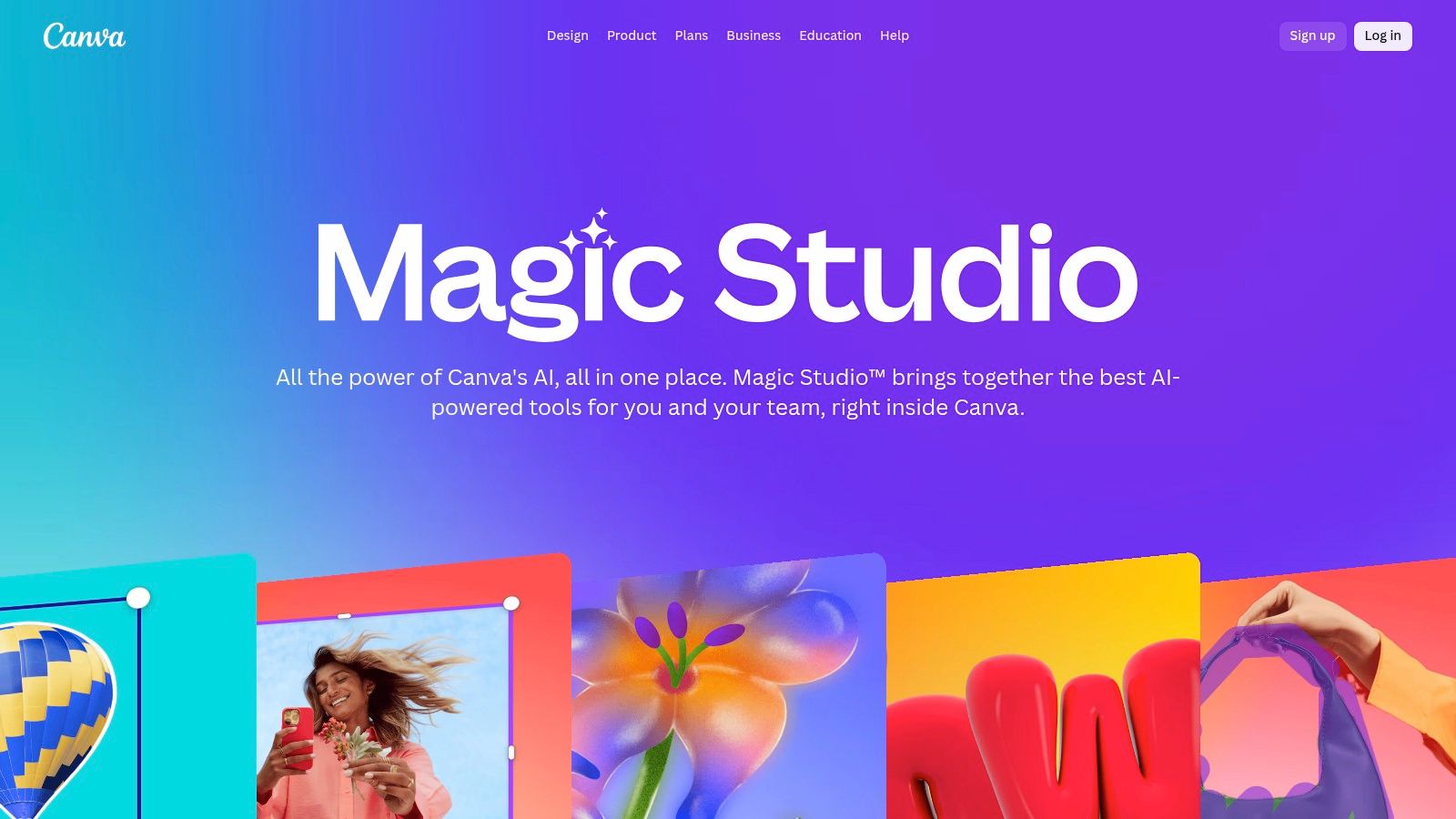
Key Features and Use Case
- Magic Write & Magic Media: Instantly generate marketing copy, blog post ideas, or social media captions. Create unique images and even short videos from simple text descriptions to use in your designs.
- Integrated Brand Kit: Ensure all AI-generated and manually created assets adhere to your brand guidelines. The Brand Kit stores your logos, color palettes, and fonts for consistent application across all designs.
- Template-Driven Workflow: Start with thousands of professionally designed templates and use AI tools to customize them with your own content, images, and messaging in minutes.
Practical Tip: Use the "Magic Switch" feature to instantly resize and reformat a design for different platforms. A single ad creative can be transformed into a Facebook post, an Instagram Story, and a LinkedIn banner with just one click, saving hours of manual work. Learn how you can use Canva automation to simplify ad creation for even greater efficiency.
Feature AnalysisAssessmentPricingCore AI features are available on the Pro plan; credits may be limited.Ease of UseExtremely intuitive and beginner-friendly, even for non-designers.Unique OfferingSeamlessly combines a world-class design editor with a suite of generative AI tools.
Pros:
- Extremely fast asset creation for social media and ads without needing a designer.
- Templates enforce brand consistency and dramatically reduce production time.
Cons:
- Advanced AI features and higher usage limits are locked behind paid tiers.
- The cost for Teams plans and AI credit packs has increased.
Website: https://www.canva.com/magic/
11. Jasper
Jasper has evolved into a comprehensive AI marketing copilot designed to create on-brand content across all your channels. It moves beyond simple text generation to become a central hub for your marketing content strategy, ensuring everything from blog posts and social media updates to ad copy and product descriptions remains consistent with your brand identity.
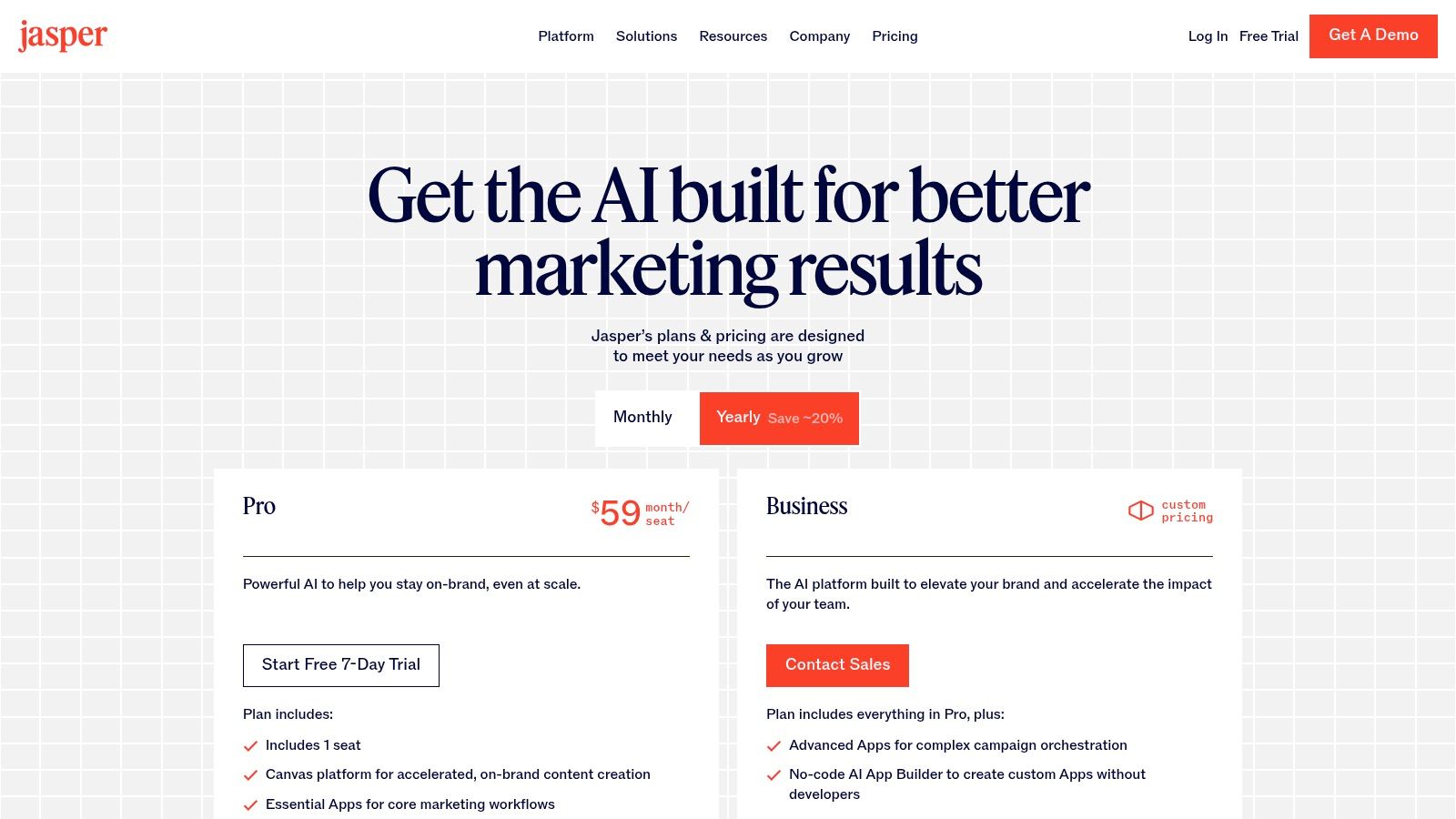
Its key differentiator is the focus on brand governance. By using features like Brand Voices and Knowledge, you train the AI on your specific tone, style guides, and product information. This ensures that every output is factually accurate and perfectly aligned with your brand, making it one of the best AI tools for marketing teams focused on consistency. Learn more about the power of AI for ad copywriting to see how this technology boosts productivity.
Key Features and Use Case
- Brand Voices & Knowledge: Upload style guides, product catalogs, and company facts to create a unique brand profile. This ensures all generated content is on-brand and factually correct.
- Canvas Workspace & Templates: Use a freeform document-style editor for long-form content or leverage hundreds of pre-built templates for specific marketing tasks like writing Facebook ads or video scripts.
- No-Code AI App Builder: The Business tier allows you to create custom, repeatable marketing workflows and internal tools without writing any code, automating routine content tasks for your team.
Practical Tip: Spend time building out a thorough Brand Voice. The more examples, style guides, and information you provide, the higher the quality and consistency of Jasper’s outputs will be, saving you significant editing time.
Feature AnalysisAssessmentPricingTiers from Creator to Business, with a per-seat model. A 7-day free trial is available.Ease of UseThe interface is clean and user-friendly, with templates guiding new users effectively.Unique OfferingDeep brand governance tools and a no-code AI app builder for custom marketing workflows.
Pros:
- Excellent for maintaining brand consistency across large marketing teams and diverse channels.
- Offers a 7-day free trial for a full evaluation of its capabilities.
Cons:
- The per-seat pricing model can become costly for larger teams or agencies.
- Requires a significant upfront investment in training to achieve the best results.
Website: https://www.jasper.ai/pricing
12. Semrush
Semrush has evolved from a pure SEO toolkit into a comprehensive online visibility platform, integrating AI deeply across its various modules. While known for its powerful keyword and competitor research, it now stands as one of the best AI tools for marketing by offering an all-in-one hub for content creation, advertising, and social media management, all enhanced with artificial intelligence. This makes it ideal for teams wanting to consolidate their marketing stack.
Its primary strength is connecting AI-driven content creation directly to SEO performance data. You can research a topic, generate an AI-powered content brief, write an article with an AI writing assistant that gives real-time optimization feedback, and then track its ranking performance-all within a single ecosystem. This unified workflow prevents the disconnect that often happens when using separate tools for strategy and execution.
Key Features and Use Case
- ContentShake AI: Generate content ideas, outlines, and full articles that are optimized for SEO from the start. It also includes an AI image generator for creating unique visuals.
- SEO Writing Assistant: Integrates with Google Docs and WordPress to provide real-time suggestions on readability, tone of voice, SEO, and originality as you write.
- AdCreative AI: Part of the Advertising Toolkit, this feature helps you generate compelling ad copy variations for PPC campaigns, saving time on A/B testing ideation.
Practical Tip: Use the "AI Writing" filter within the App Center to discover specialized AI tools that integrate directly with your Semrush account, further extending its capabilities for specific marketing tasks.
Feature AnalysisAssessmentPricingSubscription-based with tiered plans. AI features have specific usage credits that vary by plan.Ease of UseThe platform is vast, so there's a learning curve, but AI features are well-integrated and intuitive.Unique OfferingSeamlessly connects AI content generation with robust, real-time SEO analytics and competitor data.
Pros:
- Broad coverage of marketing workflows from SEO to PPC in a single platform.
- Transparent knowledge base pages clearly list current plan prices and AI credit limits.
Cons:
- Costs can escalate quickly when adding multiple toolkits, seats, or higher AI credit tiers.
- You must carefully select the right modules to avoid paying for unnecessary features.
Website: https://www.semrush.com/
Top 12 AI Marketing Tools — Features & Platform Listings
ProductCore featuresUnique selling points ✨Value & price 💰Best for 👥Trust & quality ★🏆 quickads.aiAI ad generator (image/video/shorts), 20M+ ads library, one‑click publish✨ Data‑driven creative scoring, virtual AI photoshoots, multi‑platform deploy💰 Free + $1 trial; All‑Access $99/mo; tiers $69–$739; enterprise $1,999+👥 Founders, agencies, marketing teams testing many creatives★★★★★ (25K+ customers, avg ROAS 5.12x)G2Verified user reviews, Grid reports, side‑by‑side compares✨ Deep, filterable peer insights for shortlists💰 Free to browse; no direct checkout👥 Buyers researching vendor fit, procurement★★★★☆ (review quality varies)CapterraCategory pages, vendor pricing callouts, guides✨ Curated guides + vendor feature lists💰 Free; vendor links to trials/pricing👥 Nontechnical buyers, small teams comparing options★★★★☆ (wide coverage; sponsored placements)Product HuntLaunch pages, upvotes, community comments✨ Fast discovery of new/trending AI tools & launch deals💰 Free to browse; early access/limited offers👥 Early adopters, founders, makers★★★☆☆ (early‑stage stability varies)AppSumoCurated deals, customer Q&A, refunds✨ Heavily discounted or lifetime deals for testing tools💰 Pay‑per‑deal (big savings, time‑limited)👥 Bootstrapped teams, deal hunters★★★☆☆ (deal risk: product/terms can change)Shopify App StoreApp listings, store integrations, reviews✨ Built for ecommerce workflows & fast installs💰 Free trials common; many paid monthly apps👥 Ecommerce merchants using Shopify★★★★☆ (store reviews; clear trials)HubSpot App Marketplace (AI)Installable AI agents, unified CRM workflows✨ Tight CRM + marketing integration, vetted apps💰 Varies; requires HubSpot account👥 HubSpot customers, marketing ops teams★★★★☆ (trusted ecosystem)Salesforce AppExchangeVetted enterprise apps, security & governance✨ Enterprise compliance, Einstein integrations💰 Varies; enterprise pricing/add‑ons👥 Enterprise Salesforce customers★★★★★ (strong governance & partners)Microsoft MarketplaceMS 365/Dynamics/Azure integrations, vetting✨ Procurement via Microsoft agreements & billing💰 Varies; often billed via MS agreements👥 Microsoft‑centric organizations, IT buyers★★★★☆ (broad catalog; IT focus)Canva (Magic Studio)Magic Write, Magic Media, brand kits, templates✨ Fast on‑brand asset creation for social & ads💰 Free tier; Pro/Teams pay for advanced AI limits👥 Small teams, social marketers, non‑designers★★★★☆ (very fast, some paid features)JasperAI copy, Brand Voices, no‑code app builder✨ Brand governance + marketing app templates💰 Paid plans; per‑seat costs on higher tiers👥 Content teams, marketers needing governed copy★★★★☆ (strong copy focus)SemrushSEO, content toolkit, ad & social toolkits✨ Full‑stack marketing hub with AI assist💰 Paid plans/toolkits; costs add with modules👥 SEO & performance marketing teams★★★★☆ (broad coverage; modular pricing)
Building Your AI Marketing Stack: From Tools to Transformation
Navigating the expansive landscape of AI marketing technology can feel overwhelming, but as we've explored, the right tools are not just accessories; they are foundational components of a modern, intelligent marketing engine. We've journeyed through a curated selection of platforms, from comprehensive discovery marketplaces like G2 and Capterra, which act as your strategic starting point, to specialized powerhouses like Jasper for content, Semrush for SEO, and Quickads.ai for performance ad creative. The core takeaway is clear: the era of manual, time-intensive marketing tasks is giving way to an age of augmented intelligence.
The true power of these platforms lies not in any single feature, but in their ability to form a cohesive, integrated "stack" that amplifies your team's strategic capabilities. As teams scale these stacks, having clear contracts in place is just as important, and tools like Contraxly are often used to keep terms and approvals in one place.The best AI tools for marketing are those that liberate your most valuable resource, your human talent, from the drudgery of data processing, repetitive content creation, and manual campaign setup. This allows your team to redirect their focus toward what truly matters: understanding the customer, innovating on strategy, and building meaningful brand connections.
Adopting AI is a strategic initiative, not just a technological one. It’s about empowering your team with superpowers, enabling a small business to compete with industry giants or an agency to deliver unprecedented results for its clients. The goal is to build a system where AI handles the "how" so your team can master the "why."
Your Action Plan for AI Integration
Embarking on this transformation doesn't require a complete overhaul of your operations overnight. A methodical, phased approach will yield the best results and ensure sustainable adoption. Here’s a practical roadmap to get you started:
- Identify Your Biggest Bottleneck: Before you even look at a tool, analyze your current workflow. Where is your team spending the most time for the least strategic return? Is it generating ad variations for A/B testing? Writing first-draft blog posts? Or sifting through analytics to find actionable insights? Pinpoint this single, high-friction area first.
- Start with a Pilot Project: Choose one tool from our list that directly addresses your identified bottleneck. If ad creative is your pain point, a platform like Quickads.ai is a logical starting point. If it's content scale, Jasper might be the answer. Implement it with a small, focused project and a clear objective. For example, "Reduce the time to launch a new ad campaign from 5 days to 2 days."
- Measure, Learn, and Iterate: Success with AI is not just about efficiency gains; it's about performance uplift. Track key metrics before and after implementation. Did the AI-generated ad creatives have a lower CPA? Did the AI-powered content rank faster? Use this data to justify wider adoption and to understand how the tool fits within your unique ecosystem.
- Think Integration, Not Isolation: As you gain confidence, consider how your chosen tools can work together. Can you use insights from Semrush to fuel content ideas for Jasper? Can you use analytics from your HubSpot CRM to inform the audience targeting for ads created with Quickads.ai? A truly powerful AI marketing stack is one where the tools communicate, creating a seamless flow of data and insights that drives better decision-making across the board.
Final Thoughts: From Tools to Transformation
The journey into AI-powered marketing is not about replacing human creativity but augmenting it. The platforms we've discussed are catalysts for growth, designed to handle the predictable so you can master the exceptional. By thoughtfully selecting and integrating the best AI tools for marketing into your workflow, you’re not just adopting new software; you are fundamentally upgrading your organization's capacity to innovate, compete, and win in a rapidly evolving digital landscape. The future belongs to those who can successfully merge human ingenuity with machine intelligence.
Ready to eliminate your biggest advertising bottleneck and start creating high-performance ads in minutes? See for yourself how quickads.ai leverages AI to generate entire ad campaigns, from scripts and visuals to platform-specific assets, with just a few clicks. Start your journey with one of the best AI tools for marketing and transform your creative workflow today by visiting quickads.ai.










